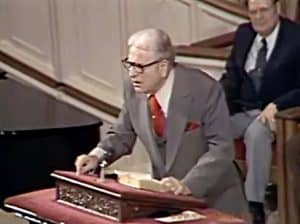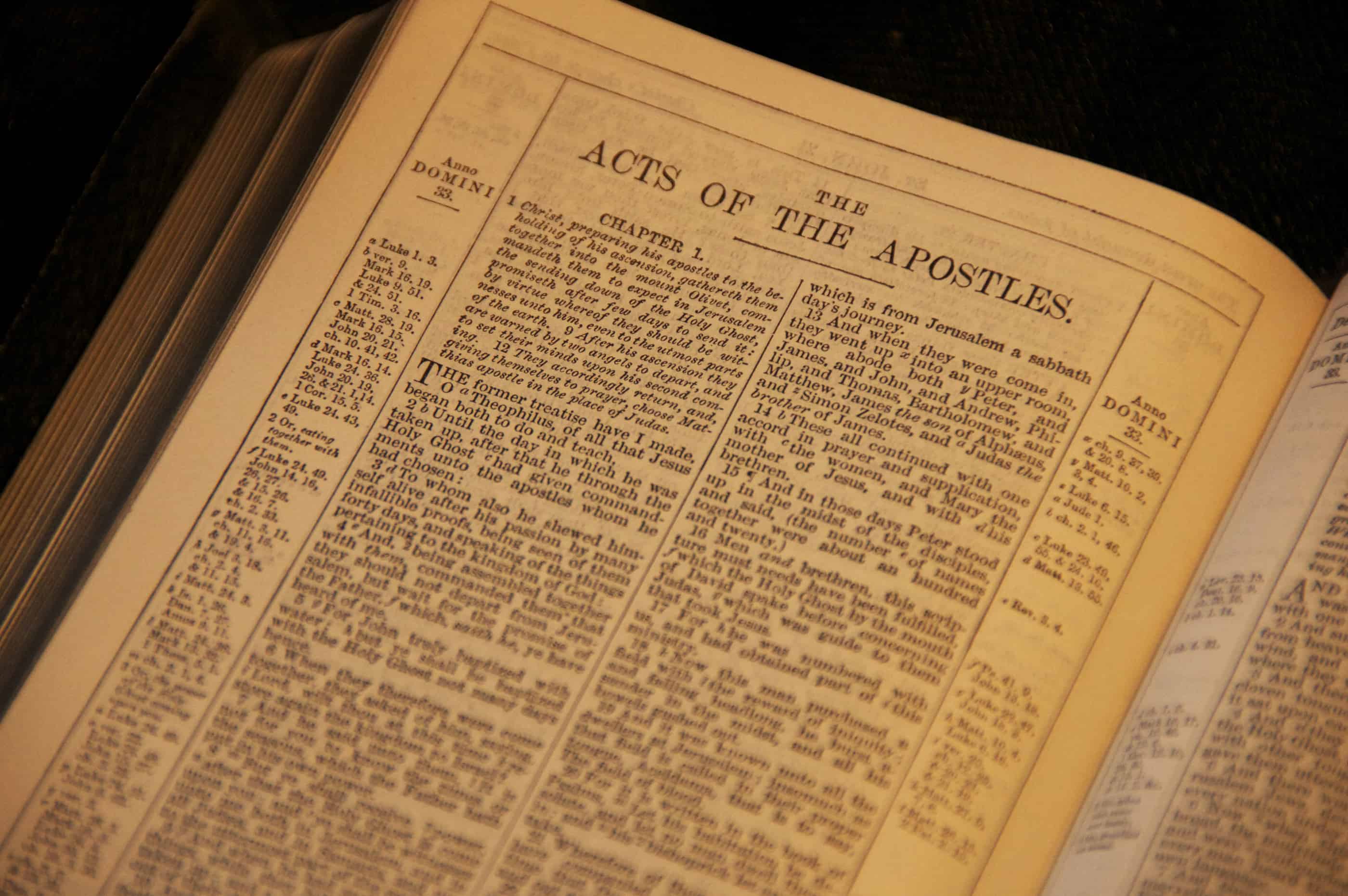One Sunday when I preached on how the Bible does not teach socialism, a woman said to me afterward, “I completely disagree with you.”
“Wonderful! What do you disagree with?”
She said, “I believe we are our brother’s keeper.”
I said, “I completely agree with you. I believe we are, too. The difference with you and me is I believe we are our brother’s keeper, and you believe that the government is our brother’s keeper.”
Her mouth fell open, and she walked out without saying another word. That concept is the difference between Christianity and socialism.
—D. James Kennedy—
Make all you can, save all you can, give all you can.
—John Wesley—
Key point: While the Bible isn’t primarily a book on economics, all it says that touches on economic activity and economic systems should be carefully heard and heeded. Did the early Christians practice socialism? How did their “experiment” as recorded in the first few chapters of Acts turn out? When we properly understand what happened and what the Bible teaches about these matters, we are not left to wonder.
To access additional Word Foundations articles on social justice, go here.
Often Acts 2:44-45 and 4:34-35 are used by advocates of socialism and “social justice” in making the case that the Bible teaches socialism. But does it?
Let’s first determine what we mean by socialism. Let’s also define the related terms communism and Marxism, and the contrasting term capitalism, or free enterprise. Then let’s examine what the Scriptures have to say.

- Socialism is “an economic system based upon governmental or communal ownership of the means of production and distribution of goods and services.”1
- Socialism is a component of Marxism, which is “an atheistic and materialistic worldview based on the ideas of Karl Marx that promotes the abolition of private property, public ownership of the means of production (i.e., socialism), and the utopian dream of a future communistic state.”2
- Communism is “the Marxist ideal of a classless and stateless utopian society in which all property is commonly owned and each person is paid according to his or her abilities and needs.”3

- Capitalism or free enterprise is “an economic system in which capital assets are privately owned, and the prices, production, and distribution of goods and services are determined by competition within a free market.”4
In our discussion, it also will be helpful to remember one more definition, one we highlighted in last week’s post. Social justice,
also known as economic justice, is a term describing the redistribution of wealth supposedly for the common good of all. However, this comes at the expense of wage earners and liberty by demanding a society to conform. Those who work and have must give to those who don’t work and don’t have.
As we indicated in a previous post, the social justice movement (and, we might add, socialism and all other related economic systems) are “obsessed with equal outcomes at the expense of equal opportunities.”

I trust that even from these definitions alone, you can see the clear connection between social justice and socialism, as well as ways social justice and socialism are related to Marxism and communism. An economic system resting on the principles of free enterprise capitalism stands as a safeguard against socialism, Marxism, and communism. Yet we cannot take anything for granted. Social justice propaganda often is used as a battering ram to weaken a society’s resolve against these three, none of which has worked in any society in history, wherever it has been tried (go here, here and here).
Social justice propaganda often is used as a battering ram to weaken a society’s resolve against socialism, Marxism, and communism, none of which has worked in any society in history, wherever it has been tried.
The Bible Speaks
Now let’s carefully examine what the Scriptures have to say.
The passages in Acts to which we already have referred are provided below in bold type, along with some surrounding verses to establish the larger context.
Acts 2:40 And with many other words he [Peter] testified and exhorted them, saying, “Be saved from this perverse generation.” 41 Then those who gladly received his word were baptized; and that day about three thousand souls were added to them. 42 And they continued steadfastly in the apostles’ doctrine and fellowship, in the breaking of bread, and in prayers. 43 Then fear came upon every soul, and many wonders and signs were done through the apostles. 44 Now all who believed were together, and had all things in common, 45 and sold their possessions and goods, and divided them among all, as anyone had need.
46 So continuing daily with one accord in the temple, and breaking bread from house to house, they ate their food with gladness and simplicity of heart, 47 praising God and having favor with all the people. And the Lord added to the church daily those who were being saved.
Acts 4:32 Now the multitude of those who believed were of one heart and one soul; neither did anyone say that any of the things he possessed was his own, but they had all things in common. 33 And with great power the apostles gave witness to the resurrection of the Lord Jesus. And great grace was upon them all. 34 Nor was there anyone among them who lacked; for all who were possessors of lands or houses sold them, and brought the proceeds of the things that were sold, 35 and laid them at the apostles’ feet; and they distributed to each as anyone had need.
36 And Joses, who was also named Barnabas by the apostles (which is translated Son of Encouragement), a Levite of the country of Cyprus, 37 having land, sold it, and brought the money and laid it at the apostles’ feet.
Beyond these verses in Acts 2 and 4, Acts 3:1–4:31, 5:1-11, and 6:1-7 also are pertinent to our discussion. Further, we will not fully understand what transpired in the early church without being reminded of the Eighth and Tenth Commandments in Exodus 20:15,17. This means that the entire larger picture of what occurred and its underpinnings can be found in Exodus 20:15,17; Acts 2:40–5:11; and 6:1-7.
Light from the Scriptures
Through His written Word, God gives for us countless nuggets of truth regarding a host of matters, including—surprisingly—economic activity and economic systems. Even though it may sound attractive and enticing, social justice rhetoric is exposed as empty and misleading in light of the Bible. Consider these ten items.

First, nothing in Scripture contradicts another part of Scripture. This was true in the days of the early church, just as it always has been true ever since God began revealing Himself through His Word.
The early church existed at a pivotal time. While God’s ceremonial law was about to be ushered out, His moral law would remain. Obedience to the law was not a requirement for salvation, but a result of it. The Ten Commandments still were valid principles for living, just as they are today. These include the Eighth Commandment, “You shall not steal,” and the Tenth Commandment, “You shall not covet….” These two divine commands uphold property rights and are antithetical to socialism.
While here we won’t cite additional Bible passages that uphold economic freedom and property rights, we could—and in future posts, we will. The Bible assumes, affirms, and authorizes personal economic freedom, both directly and indirectly. As former college professor Alvin J. Schmidt writes in his excellent work How Christianity Changed the World, “There is not a single reference in either the Old or New Testament in which God denies economic freedom to people as do fascism, socialism, and communism.”5
There is not a single reference in either the Old or New Testament in which God denies economic freedom to people as do fascism, socialism, and communism.
—Alvin J. Schmidt—
Second, Luke gives us an accurate record of what happened. Even so, the fact that for a short time believers in the early church contributed to and drew from a common store of goods does not, in itself, mean the Bible approves of what occurred, or that what happened represents God’s ideal. As our discussion continues to unfold, we will see that problems arose from this arrangement. A parallel example can be found in the polygamous marriages of the Old Testament. While God allowed polygamy to occur, even in some instances among His people, polygamy does not represent His ideal for marriage. Marriage is one man and one woman committed to each other for life.
Third, the generosity of church members arose in a context of a community of committed believers who feared God, praised God, and were overcome with a sense of awe regarding what He was doing in their midst. Generosity is commanded in Scripture (see Ps. 112:5; Prov. 11:24-25; 19:17; 22:9; Luke 6:38; 12:29-34; Acts 20:35; 1 Cor. 9:11; Gal. 6:2; 1 Tim. 6:17-19; Heb. 13:16; 1 John 3:16-18). Note carefully that if “giving” is coerced, it is not giving; nor is it charity. Socialism and its related systems advocate a forced redistribution of wealth and resources.
Fourth, closely related to item #3 is a reality that completely refutes the notion the early church practiced socialism. When those involved in the early church “had all things in common,” none of the goods that made up the store of common resources was owned by the group from the outset; instead, each item of value, whether money or goods, was donated freely and voluntarily.
It is difficult to overstate the importance of this point. Dr. Alvin Schmidt writes,
If we fail to understand that the involuntary, coercive nature of socialism and its state socialist programs is highly incompatible with the economic practices that some of the early Christians engaged in when they voluntarily ‘had all things in common’ (Acts 2:44, NKJV), we may think that socialism is a good way to practice Christianity.…[Yet] something that is done involuntarily or as a result of compulsion is no longer Christian.6
Anything done involuntarily or as a result of compulsion cannot be Christian.
—paraphrase of a statement made by Alvin Schmidt—
Fifth, the free and voluntary donations came from individuals and families who owned them privately. This harks back to the property rights affirmed in the Eighth and Tenth Commandments. Government was not involved; nor was the community of believers considered to be owner of anything that was not donated. (Later, in item 8, we will look again at the fact that the government had nothing whatsoever to do with the church’s activities, except possibly in an extremely minor, indirect way.)
We see a clear affirmation of private property rights almost precisely at this point in the early church, in Acts 5:1-11, from none other than the apostle Peter himself. When donations were being made to the common treasury, Ananians and Sapphira, a husband and wife in the early church, sold a piece of property and brought a portion of the proceeds to the apostles. They claimed they were bringing the entire amount but actually held a portion back. Their primary offense wasn’t failing to donate all of the proceeds, but lying about it. To their own peril, they lied to God Himself.

Peter confronted Ananias about his treachery, saying, “Ananias, why has Satan filled your heart to lie to the Holy Spirit and keep back part of the price of the land for yourself? While it remained, was it not your own? And after it was sold, was it not in your own control? Why have you conceived this thing in your heart? You have not lied to men but to God” (5:3-4, emphasis added). Both Ananias and Sapphira died premature deaths as a result of their deception.
Again, note carefully—it was their deception that cost them their lives, not a failure to give a certain amount. It is clear that people were not obligated to contribute to the treasury that was used to meet church members’ needs.
Sixth, giving occurred periodically, as various needs arose. In other words, this was not a pre-planned redistribution of wealth with equalization of resources among all parties as the goal, as we would expect with a true experiment in socialism.7
Rather, it was an effort—actually these were efforts—made among God’s people to meet real needs as they occurred within the body of Christ. The believers “sold their possessions and goods, and divided them among all, as anyone had need” (2:45, emphasis added). Acts 4:35 echoes this. “[T]hey distributed to each as anyone had need” (emphasis added).
The verb tenses in the text also are consistent with periodic giving and distribution. The New Testament in the Language of the People accurately reflects this important detail:
- “And so they continued to sell their property and goods and to distribute the money to all, as anyone had special need” (2:45, emphases added).8
- “For none of them was in want, for as many of them as were owners of farms or houses proceeded to sell them, one by one, and continued to bring the money received for the things sold and to put it at the disposal of the apostles; then distribution was continually made to everyone in proportion to his need” (4:34-35).9
Seventh, Luke did not report that everyone—or even that anyone—in the community of believers was claiming that the property of each belonged to all, as socialism dictates. Instead, Luke reported that no one said “that any of the things he possessed was his own” (4:32).10 The fact that (1) those who owned property didn’t consider it their own is very different from (2) those in need claiming ownership of property that wasn’t already theirs—an integral component of socialism.

Luke was highlighting the attitude of those who gave, as well as the commitment of believers to steward responsibly all God had entrusted to them. We see this same attitude among gracious hosts and hostesses today. If the lady of the house greets a family who has come to visit by saying, “Welcome to our home; what’s ours is yours,” she isn’t relinquishing ownership of her house and everything in it to her family’s guests. It’s especially true that she’s not relinquishing her family’s right to private ownership. She’s simply being hospitable and expressing the willingness of the family to meet immediate needs. This was the attitude of the believers who sold their property and brought the revenue to the apostles. They knew people were more important than property—and we need to realize this same thing today.11
Eighth, these gifts in the early church were spontaneous. By contrast, with socialism, taxation is orchestrated. Here no church leader or government authority concerned himself with administering resources to meet church members’ needs—until the gifts started coming in. At that point, management of the resources became a concern for the church leaders only—not the government.
What were the authorities in Jerusalem concerned about? They were persecuting the apostles for healing “a certain man lame from his mother’s womb” (3:2) and attributing the miracle to Jesus Christ. Peter declared that “by the name of Jesus Christ of Nazareth, whom you crucified, whom God raised from the dead, by Him this man stands here before you whole” (4:10; see 2:40-4:37 for the larger context). The authorities, therefore, were laser-focused on how to keep the apostles from speaking publicly in Jesus’ name.
Likewise, as we might expect, the apostles’ primary concern, and the church’s, was that the church and the individuals in it would “with all boldness…speak” the truth of God (see 4:29).
The persecution the authorities brought against the church drew church members closer together. With closer relationships, needs become known more readily, but that was the extent of the government’s involvement in the sharing of resources within the church.
Ninth, those who gave to meet the needs of fellow church members laid their donations “at the apostles’ feet” (4:35). That makes it a “slam dunk” that the church didn’t engage in socialism! In this 45-second audio clip from His sermon “The Bankruptcy of Socialism,” Dr. D. James Kennedy explains.

Tenth, the common store approach was not “ever repeated anywhere else.”12 Why? It simply didn’t work! In fact, it created all kinds of problems for the church and its leaders.
“Trouble! Trouble! Trouble!”
We saw a hint of the problems that arose as a result of the common store in Ananias’s and Sapphira’s attempt to deceive the church and the apostles (see item #5 and Acts 2:3–5:11). Did this couple want so desperately to “get in on the act” of donating proceeds from the sale of their land that they decided to try to mislead their fellow believers? In Acts 4:36-37, Luke writes that “Joses, who was also named Barnabas by the apostles (which is translated Son of Encouragement)” had just contributed proceeds from land he had sold. Barnabas clearly was well-known and well-liked in the early church. Did Ananias and Sapphira want to “make a name for themselves” as donors of a large amount? We cannot know with certainty, but neither can we dismiss this possibility.
Furthermore, in Acts 6:1-7, “there arose a complaint against the Hebrews by the Hellenists, because their widows were neglected in the daily distribution” (emphasis added). Is this more evidence of problems arising from the common store approach? While it is legitimate for the church to address widows’ concerns, their immediate family members should be the first to meet their physical needs. The complaints that arose in the early church in Acts 6 are consistent with the kinds of challenges that come from meeting needs with a common treasury from which everyone with a need has a “right” to draw.
Telling it Like it Is

On Sunday evening, March 6, 1977, Dr. W. A. Criswell, pastor of the First Baptist Church of Dallas, Texas for more than fifty years, preached a sermon titled “Christian Communism.” In the sermon, he primarily uses the term communism, but what he says about communism applies to socialism as well. Also, he describes the failure of both of the forms of communism he discusses— “political communism” and “religious communism.”
The early church’s common store approach—whatever one calls it—didn’t work, nor does it work.
Even if one contends the members of the early church, for a variety of reasons like those we’ve cited here, didn’t practice socialism, Dr. Criswell would say the approach they took was enough like socialism to make it fail completely. The early church’s common store approach—whatever one calls it—didn’t work, nor does it work. In this four-and-a-half-minute must-hear clip, Dr. Criswell blasts communism and socialism as thoroughly unbiblical systems as he describes the problems the early church faced.
Pastors, Preach the Truth About Socialism!
May we learn from the experience of the early church and thereby avoid the kinds of problems they faced—on both national and local levels.
Moreover, may pastors in our day take their cues from Dr. Kennedy and Dr. Criswell. May they preach the whole council of God regarding economic freedom, as well as the perils of socialism, Marxism, and communism.
Increasingly, Americans—especially the young—are being duped by social justice rhetoric. They are being led to believe that socialism is a just, fair, and workable system.
Nothing could be further from the truth. Not only is it unjust, but it also is disastrous and deadly.
Even if you’re not a preacher, you have a certain amount of influence. On whatever platforms God has given you, will you speak the truth?
This article originally appeared in two parts. Part 1 is available here and part 2 here.
Copyright © 2019 by B. Nathaniel Sullivan. All rights reserved.
Unless otherwise indicated, Scripture passages have been taken from the New King James Version®. Copyright © 1982 by Thomas Nelson, Inc. Used by permission. All rights reserved.
top image credit: Lightstock
Notes:
1Jeff Myers and David A. Nobel, Understanding the Times: A Survey of Competing Worldviews, (Manitou Springs, CO: Summit Ministries, 2016), 100.
2Ibid.
3Ibid.
4Ibid.
5Alvin J. Schmidt, How Christianity Changed the World, (Grand Rapids: Zondervan, 2004), 205.
6Schmidt, 205-206.
7Calvin Beisner, Social Justice: How Good Intentions Undermine Justice and Gospel, (Burke, VA and Washington, D.C.: Cornwall Alliance for The Stewardship of Creation, Concerned Women for America, Family Research Council, 2013), 8. You can download this publication here.
8Charles B. Williams, translator, The New Testament in the Language of the People, (Chicago: Moody Press, 1972, [original copyright © 1937]), 262.
9Williams, 266.
10Beisner, 8.
11Beisner.
12Dr. D. James Kennedy, in his sermon “The Bankruptcy of Socialism,” at approximately the 15:18 mark.
